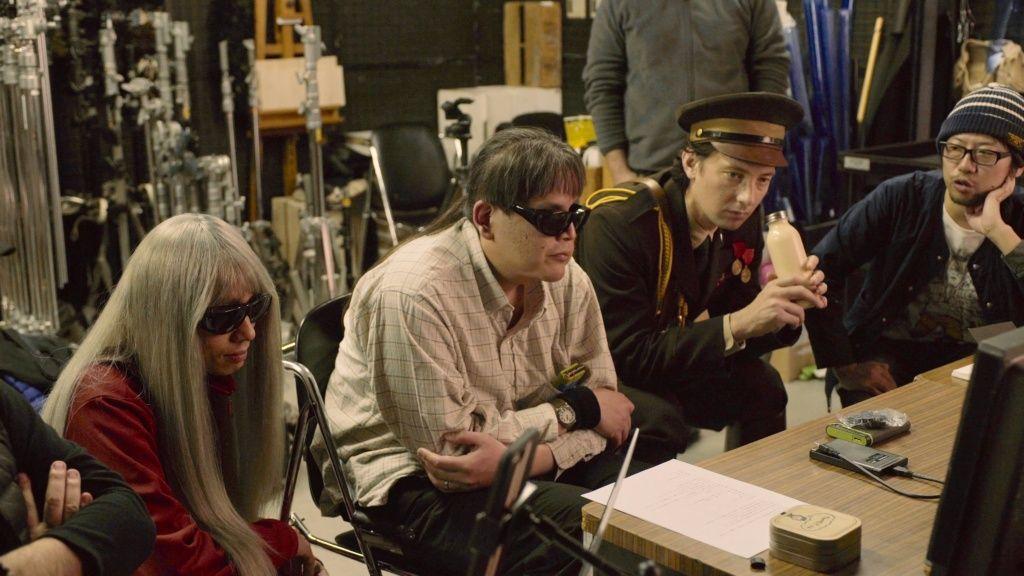
For as long as I can remember about buying DVDs, one of the best things I’ve enjoyed is getting to immers myself in the extensive behind-the-scenes featurettes. This especially attrributes to my love for action films since I enjoy seeing the creative process unfold, watching how the director, cast and crew work together between meetings and bustling on-set schedules.
This is particularly what made watching Makoto Sasaki’s latest documentary, Night Cruising, such a feat – one as transformative and palpable in nature highlighting the efforts of a congenitally blind musician and editor named Hideyuki Kato dare to go boldly where blind people rarely tread: filmmaking. Save for its budget, he’s not playing it safe either – this a bold, experimental sci-fi action short that does a number of things to challenge conventional filmmaking methods.
Indeed, what we get for the two-hours and twenty-four minutes of Sasaki’s Night Cruising is a journey into the mechanics of directing a film from the perspective of a blind artist who, for all intents and purposes, has his own ideas. To do this, we witness as Kato propels himself into a stratosphere of constant learning, expanding his perceptions on both physical and metaphysical aspects of storytelling in a multitude of meetings with professionals in fields of both cinema as well as science.
He learns how to apply color to what he wants seen on screen, learns how the human body moves with respect to fight action and stunts, and even how his own body looks on a pre-viz template. Sasaki also shows us how Kato uses his own tools and wealth of knowledge to visualize and sense story ideas and set pieces – at one point using different-sized balls as planets and how to construct outerspace from a point of practicality, and even actors’ performances, from writing a script using a special keyboard and using “raised paper” to get a handle on certain shapes, to the use of 3D-printed canvases of concept art to establish more detailed notions of what Kato’s impassioned sci-fi world eluicates.
As for the project itself, it’s set on an asteroid planet where a solider sets out to recruit a non-sighted fighter to help hunt down a hacker known as “the ghost”. Hence the title, “Ghost Vision”. It’s roughly a little over ten minutes and it’s definitely not the most commercial piece of work, but it’s a labor of love that presents an air of ambition that the artists and producers involving themselves on this project seem to visibly appreciate.
Indeed, the first thirteen minutes of Night Cruising feels like it’s exactly that – iterating an intentional, albeit immersive documentary that aptly indicates much of what non-sighted people experience, if anything, when it comes to everyday life, including watching a movie. Kato himself joins in a raft of several other blind individuals who share their perspectives and opinions on living as a blind people who otherwise grew up and perhaps still themselves enjoy movies.
In Sasaki’s Night Cruising, Kato does all the more to challenge the many conventions that the industry is used to when it comes to film directing. It’s with this documentary that he firmly plans a seed into the minds of anyone watching what they can set out to achieve, even if the result is subpar and not “popular” or “acceptable” or even mired in doubt long before the idea is even given a chance to flourish.
I’m not trying to sound preachy here either. The struggle for Kato is all the more real, as hinted in a scene with a voice actor who shares his hopes for Kato to one day take on a bigger feature project – to which Kato replies by saying “It’s not that I don’t want to, but life isn’t so generous.” Generally, he knows what he’s trying to accomplish is a hard nut to crack, although it’s this point in the documentary that his optimism has already superseded a lot of his cynical suppositions about achieving his latest film.
Simply put, what Night Cruising does is spotlight a moviegoing demographic we nary hear from: blind people. Best and quite interesting of all is that Kato himself is also just one voice among a group of other non-sighted film directors generating chatter on blind filmmakers and the craft.
Night Cruising serves one of the best efforts in that regard, with “Ghost Vision” possibly planting a seed for something truly awesome from filmmakers such as himself, present and future.

